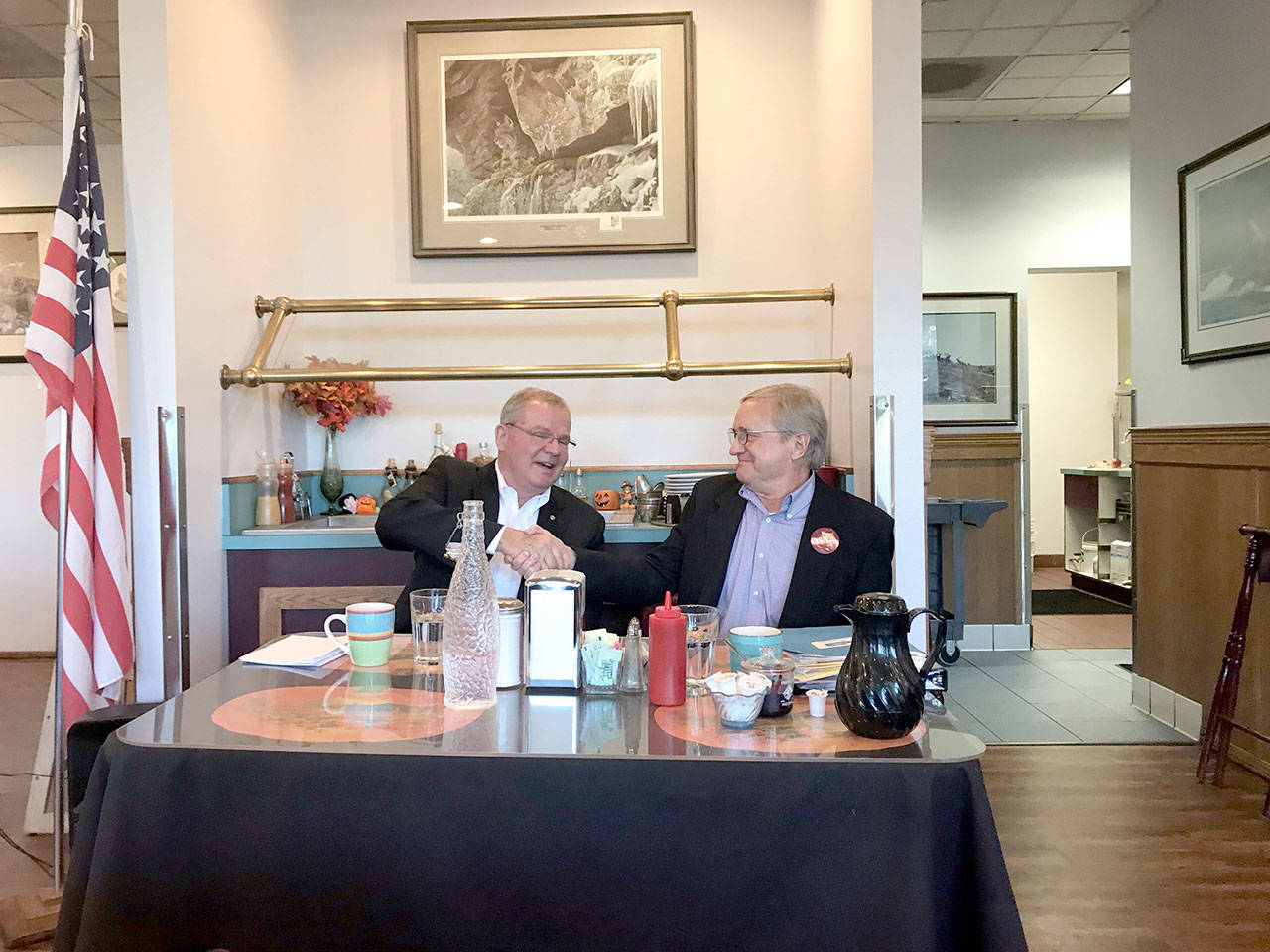PORT ANGELES — Two candidates for state Legislature had different takes on measures involving guns and taxes at a general election forum, where they also weighed in on the recent confirmation of U.S. Supreme Court Associate Justice Brett Kavanaugh.
Incumbent 24th District state Rep. Steve Tharinger and former Clallam County and Port of Port Angeles Commissioner Jim McEntire were featured at the Tuesday morning get-together in Port Angeles.
Tharinger, a Port Townsend Democrat formerly of Sequim, and McEntire, a Sequim Republican, took questions from members of the Port Angeles Business Association at the group’s weekly breakfast meeting.
Ballots will be mailed in one week — on Oct. 17 — to voters in the 24th District, which includes Clallam and Jefferson counties and the northern half of Grays Harbor County, including Hoquiam. Ballots are due or must be postmarked by Nov. 6.
The Peninsula Daily News’ 2018 Voter Guide will be inserted in this Sunday’s edition. The 28-page special section will include information on statewide ballot measures and questionnaires answered by the candidates, including Tharinger and McEntire.
They are vying for the two-year Position 2 seat held by Tharinger since 2010, when McEntire unsuccessfully ran for the seat.
The two disagreed Tuesday on a capital gains tax championed by Tharinger.
The former three-term county commissioner wants the state to impose the 2.7 percent annual excise tax on couples making $500,000 in capital gains and individuals making $250,000 in capital gains.
He said it would affect 5,000 people in the state and raise $1.2 billion, with exemptions for sales of sole-proprietorships, primary residences and timber.
The tax revenues would help cover “that 30-cent [property] tax break we gave you” during the last legislative session, Tharinger said.
The lowest 20 percent of income earners pay 17 percent of their income in taxes compared to the upper 20 percent who pay 2 percent of their income in taxes, he said.
The tax increase would allay the revenue reduction that cut into the state budget by $300 million to $400 million, allowing lawmakers to “make adjustments over time,” he said.
Like Tharinger, McEntire said he unequivocally opposed a state income tax, the topic of the original question.
Tharinger said he also opposed such a tax, but asserted Washington state has “the most regressive tax structure in the country.”
But McEntire argued that Tharinger’s proposal would open the door to a state income tax and would in fact tax income.
“This is yet another example of a quest by some to pursue the Holy Grail of a state income tax,” McEntire said.
“When you transact business, and cash flows from that transaction, that’s income.
“It can’t be anything else.”
If the state of Washington taxes capital, businesses will move elsewhere, McEntire added.
One questioner asked the candidates’ opinions on statewide firearms-control Initiative 1639, which would increase the restrictions on the purchase and ownership of semiautomatic assault rifles.
It would increase background checks, set a minimum age limit of at least 21 years old for their purchase that already applies to pistol purchases, and criminalize noncompliant storage if the weapons are stolen and used in an unauthorized manner, such as injuring someone, according to the state Secretary of State’s Office Voters’ Guide (tinyurl.com/PDN-FirearmsLaw).
The questioner was concerned about the impact the initiative would have on his ownership of a 60-year-old rifle his father gave him.
“The initiative defines semiautomatic assault rifles not to include antique firearms, permanently inoperable firearms, or any firearm that is manually operated by bolt, pump, lever or slide action,” according to the state Voters’ Guide.
Calling I-1639 ill-considered, McEntire said its backers are trying to create fear and that the age limit creates “blatant discrimination” and “an entire suspect class” of residents who can already vote, join the military and get married. The age limit already applies to pistol purchasers.
More effort should be placed on mental health issues, the Involuntary Treatment Act and personal responsibility for recognizing warning signs of violent behavior, not “the instruments” of that behavior, he said.
“This initiative does not really address that,” McEntire said.
I-1639, he said, “is like addressing obesity by outlawing spoons and knives and forks.
“It’s really nonsense. It doesn’t help.”
“It’s odd to compare knives and forks to assault rifles, quite frankly,” Tharinger responded.
“These are not knives and forks, these are deadly weapons.”
Saying in a later interview that he will vote for I-1639, Tharinger told the breakfast-goers that public health is served by regulating semi-automatic assault rifles and warning owners that the weapons could be harmful — a warning would be included on pistol and assault-rifle purchase applications cautioning applicants of increased risks of the presence of firearms in the home.
Both men were asked how they would have responded if the sexual-assault controversy involving new Kavanaugh “had played out here in Washington state,” where District and Superior Court judges, and state Supreme Court justices, are elected by popular vote.
Kavanaugh was sworn in Monday after bitter debate in the U.S. Senate and a sharply partisan 50-48 vote.
Tharinger said that during recent Senate hearings, “more respect” should have been shown to Christine Blasey Ford, who accused Kavanaugh of sexual assault when the two were of high school age.
“Sexual assault is a big issue,” Tharinger said.
“We are trying to get a better system so people feel comfortable coming forward.
“That obviously did not come out of those hearings.”
The FBI investigation of Ford’s claims was not thorough enough, Tharinger added.
McEntire said it was a “catastrophic failure” of the Senate Judiciary Committee that both Kavanaugh and Ford were not treated with respect and dignity.
He said there is no statute of limitations on sex crimes in Maryland, where the alleged assault occurred.
“The FBI does not investigate local crimes,” McEntire said.
“Proof must be offered” to substantiate allegations about improper behavior, he added.
________
Senior Staff Writer Paul Gottlieb can be reached at 360-452-2345, ext. 55650, or at pgottlieb@peninsuladailynews.com.
